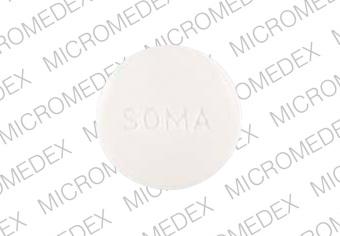Soma Disease Interactions
There are 3 disease interactions with Soma (carisoprodol).
Carisoprodol (applies to Soma) porphyria
Major Potential Hazard, High plausibility.
The use of carisoprodol is contraindicated in patients with acute intermittent porphyria. Carisoprodol is partially metabolized to the pharmacologically active meprobamate, which has been reported to precipitate acute attacks of porphyria in susceptible patients.
References
- "Product Information. Soma (carisoprodol)." Meda Pharmaceuticals PROD (2001):
- Hazen PG "Pseudoporphyria in a patient receiving carisoprodol/aspirin therapy." J Am Acad Dermatol 31 (1994): 500
- Braunwald E, Hauser SL, Kasper DL, Fauci AS, Isselbacher KJ, Longo DL, Martin JB, eds., Wilson JD "Harrison's Principles of Internal Medicine." New York, NY: McGraw-Hill Health Professionals Division (1998):
Carisoprodol (applies to Soma) drug dependence
Moderate Potential Hazard, Moderate plausibility. Applicable conditions: Alcoholism, Drug Abuse/Dependence
Carisoprodol is partially metabolized to meprobamate, a pharmacologically active agent with known addictive potential. According to the manufacturer, abrupt cessation of carisoprodol 100 mg/kg/day (approximately 5 times the recommended daily adult dosage) was associated with mild withdrawal symptoms such as abdominal cramps, insomnia, headache, nausea and chills in some study subjects. In clinical use, psychological dependence and abuse have been rare. Nevertheless, therapy with carisoprodol should be administered cautiously in addiction-prone individuals, such as those with a history of alcohol or substance abuse. It may be prudent to refrain from dispensing large quantities of medication to these patients.
References
- Elder NC "Abuse of skeletal muscle relaxants." Am Fam Physician 44 (1991): 1223-6
- Luehr JG, Meyerle KA, Larson EW "Mail-order (veterinary) drug dependence." JAMA 263 (1990): 657
- Morse RM, Chua L "Carisoprodol dependence: a case report." Am J Drug Alcohol Abuse 5 (1978): 527-30
- "Product Information. Soma (carisoprodol)." Meda Pharmaceuticals PROD (2001):
Carisoprodol (applies to Soma) renal/liver disease
Moderate Potential Hazard, High plausibility. Applicable conditions: Renal Dysfunction
Carisoprodol is primarily converted in the liver to several metabolites, one of which (meprobamate) is pharmacologically active. The metabolites and a small amount of the parent drug are excreted in the urine. Patients with impaired renal and/or hepatic function may be at greater risk for adverse effects due to drug and metabolite accumulation. Therapy with carisoprodol should be administered cautiously in such patients.
References
- "Product Information. Soma (carisoprodol)." Meda Pharmaceuticals PROD (2001):
Soma drug interactions
There are 368 drug interactions with Soma (carisoprodol).
Soma alcohol/food interactions
There is 1 alcohol/food interaction with Soma (carisoprodol).
More about Soma (carisoprodol)
- Soma consumer information
- Check interactions
- Compare alternatives
- Pricing & coupons
- Reviews (203)
- Drug images
- Side effects
- Dosage information
- During pregnancy
- Generic availability
- Support group
- Drug class: skeletal muscle relaxants
- Breastfeeding
- En español
Related treatment guides
Drug Interaction Classification
| Highly clinically significant. Avoid combinations; the risk of the interaction outweighs the benefit. | |
| Moderately clinically significant. Usually avoid combinations; use it only under special circumstances. | |
| Minimally clinically significant. Minimize risk; assess risk and consider an alternative drug, take steps to circumvent the interaction risk and/or institute a monitoring plan. | |
| No interaction information available. |
Further information
Always consult your healthcare provider to ensure the information displayed on this page applies to your personal circumstances.


